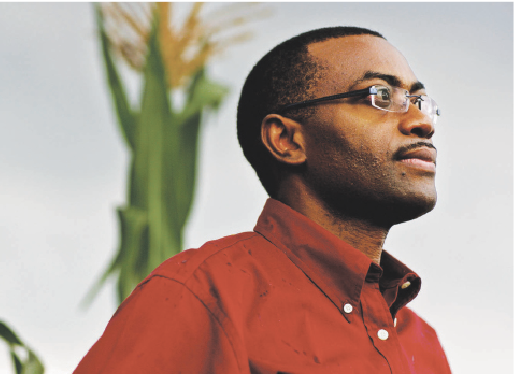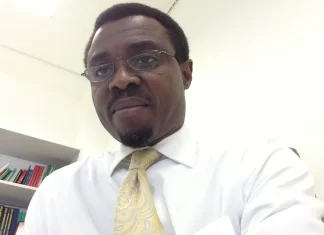Last week was momentous for Nigeria’s global image – Akinwunmi Adesina’s emergence as Africa Development Bank (AfDB) President and the peaceful transition that brought Muhammadu Buhari to Aso Rock, writes Acting News Editor ISHAYA IBRAHIM.
Nigeria is on the global spotlight, this time for the good reasons. On May 28, immediate past Agriculture Minister, Akinwunmi Adesina, emerged President of the Africa Development Bank (AfDB). The following day, Muhammadu Buhari was inaugurated as Nigeria’s 15th head of state. These two events have earned Nigeria and Nigerians global respect and applause.
Adesina will take over from Donald Kaberuka on September 1 this year to become the bank’s eighth president. The former agriculture minister is highly regarded for his impressive academic qualifications and sound agriculture policy. He has a Ph.D in Agricultural Economics (1988) from Purdue University, United States of America, and was awarded the most outstanding Ph.D thesis. He had earlier bagged his master’s degree in Agricultural Economics from the same university, and bachelor’s degree (First Class Honours) in Agricultural Economics from University of Ife, in 1981. So, in terms of competence, he is well rounded for the position.
Buhari emerged president in an election that was qualified as fairly better than the 2011 outing. Against western prediction of doom in the election, immediate past president, Goodluck Jonathan, doused tension by conceding defeat.
The transition process, initially characterised by distrust and non-cooperative posture of the Jonathan administration, later ended well in a ceremony that was attended by about 50 heads of state, western and African diplomats, international businessmen and representatives of the United Nations (UN).
“We co-operated to surprise the world that had come to expect only the worst from Nigeria,” Buhari said.
The United States Secretary of State, John Kerry, led the U.S. delegation, a sign that Nigeria’s strained relationship with Big Sam is over. The U.S. government had denied Nigeria the sale of U.S.-made Cobra fighter-helicopters, which the Nigeria military said it badly needed to crush the Boko Haram terrorists. The U.S. cited human rights issues against the Nigerian military, a reason it said it would not approve the sale of the weapon.
Another sign of Uncle Sam’s unhappiness with Nigeria was when President Barack Obama ordered the release of $35 million worth of U.S. military and defence assistance to France which has been backing the military of Chad, Niger and Mali in the fight against the jihadist group, ignoring Nigeria that has been at the receiving end of the five-year insurgency.
A press statement from the White House on April 29 said: “By the authority vested in me as President by the Constitution and the laws of the United States of America, including Section 301 of title 3, United States Code, I hereby delegate to the Secretary of State the authority under section 506(a)(1) of the Foreign Assistance Act of 1961 to direct the drawdown of up to $35 million in defense services of the Department of Defense to provide assistance to France in its efforts to secure Mali, Niger, and Chad from terrorists and violent extremists, and to make the determinations required under such section to direct such a drawdown.”
With the inauguration of Buhari and election of Adesina, Nigeria may now be a respected global player and a force to reckon with in the international polity, says Pita Ochai, a journalist familiar with international politics and diplomacy. “Under Jonathan, Nigeria was regarded as a breeding ground for corruption. By electing Buhari, known for his no-nonsense reputation, the international community now feels we can be taken seriously.”
The emergence of Adesina as the helmsman of AfDB may also be a plus for Buhari in actualising the many promises he made to Nigerians. The bank’s major role is to contribute to the economic and social progress of its regional member countries – individually and collectively, by granting soft interest loans.
Tunde Oseni, lecturer at the Department of Politics and International Relations, Lead City University in Ibadan, affirmed that Buhari would benefit from Adesina’s presidency at the AfDB.
“Every country in this world always acts on the basis of what is known as realism in political science. So, as a realist government, or as a realist in-coming government, the Buhari team feels that though Adesina is a Jonathan man, he can also be a man of Buhari if he becomes the African Development Bank President,” Oseni said while explaining Buhari’s reason for supporting Adesina before the election.
“Nigeria is called the biggest economy in Africa in terms of GDP. So, having a man from Nigeria at the helm of affairs at the African Development Bank will boost our economy in a way because Nigeria will not have to go cap-in-hand to maybe South Africa or to Ghana or to any other African country. You have your man right there. So, it is easier for Buhari to approach Adesina, who is a Nigerian, than Buhari to approach a non-Nigerian president of the African Development Bank,” the don added.
Nigeria now has another fresh start in its global engagement.














